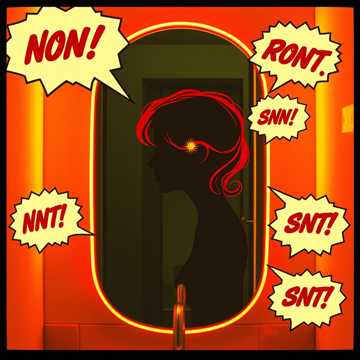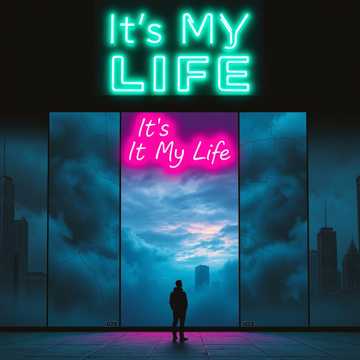
Free Self-deception Music Generator Powered by AI
Turn text into high-quality Self-deception music effortlessly – no login required!
music.toolTips

Lembranças
A melancholic ballad about love, loss, and emotional vulnerability, 'Lembranças' explores the complexities of relationships, self-deception, and yearning, set to a gentle acoustic melody with a female vocal performance.
01:56
22 minutes ago

Ты уже меняешься
A raw, confrontational song exploring themes of self-deception, changing desires, and the complex inner conflicts of identity. The track features a minimalistic Russian trap beat and a dominant, whispered vocal delivery.
02:03
Invalid date

Архидисс на Архидьявола
A dark battle-rap song exploring themes of betrayal, addiction, and the hollow nature of false heroism. It criticizes exploitative behaviors and delves into the world of microloans, dishonesty, and self-deception, all with a hard-hitting, grimy beat.
03:26
9 hours ago

Антон под бит
A Russian trap anthem that critiques a character named Anton for his delusions of grandeur and lack of substance. The song combines sharp, mocking lyrics with aggressive beats, highlighting themes of failure, self-deception, and viral culture.
01:56
Invalid date

taca nada
A humorous, high-energy song exploring the contradictions of a man who boasts about his charm but falters when it comes to action. Blending hip hop and trance, it offers a unique commentary on bravado, lust, and self-deception.
03:01
17 hours ago

Goede Mongool
A high-intensity Dutch drill track exploring themes of ego, self-deception, and social dissonance. With sharp lyrics and a hard-hitting beat, it critiques toxic masculinity and societal posturing.
02:46
1 days ago

Пьяный дом
A moody Russian ballad about love, self-deception, and emotional struggle. With lush production and heartfelt lyrics, it explores the complexity of a toxic relationship and the desire for redemption.
04:44
1 days ago

The Greatest Liar
A powerful R&B song about personal deception, the emotional toll of isolation, and the internal battle to confront one's own lies, captured through soulful male vocals and an energetic melody.
03:37
2 days ago

Милфхантер из Луганска
A dark trap ballad exploring a man's emotional journey through love, sacrifice, and self-deception in the grim reality of his life in Lugansk. The AI-generated song features haunting melodies and a raw, introspective narrative.
04:25
2 days ago

TUZAK
‘Tuzak’ delves into the emotional journey of self-deception, betrayal, and the struggle for self-identity, set against a dark, menacing trap backdrop. The powerful lyrics and intense melody captivate with raw vulnerability and resilience.
03:11
2 days ago

Spec
A powerful critique of false pretenses and empty success, 'Spec' combines dark wave and electropunk, exposing the fragility of those who fake expertise and power in a world built on lies.
03:02
2 days ago

قلبٍ على الوهم
A deeply emotional Arabic ballad, 'قلبٍ على الوهم' delves into themes of love, pain, and self-deception, expressed through gentle oud melodies and heartfelt male vocals. The song's confessional tone builds to an emotional climax, before resolving with delicate vocal phrasing.
04:12
2 days ago

Titi à 3 grammes
A melancholy yet swagger-filled track about Titi, a man struggling with his self-destructive habits. Caught between fleeting moments of pride and despair, he dreams of wealth and love but remains trapped in a cycle of alcohol and regret. Raw, emotional, and real.
02:35
2 days ago

BAD LAIR
A raw rock anthem about internal struggles, heartbreak, and the destructive nature of lies. The narrator grapples with love, trust, and self-deception, ultimately revealing their flaws and yearning for redemption.
04:16
3 days ago

BAD LAIR
A high-energy hybrid of rap, rock, and electronic sounds, 'BAD LAIR' explores inner turmoil, self-doubt, and emotional conflict, with intense lyrics delivered over gritty beats and dramatic shifts in melody.
03:40
3 days ago

Гордыня 1.0
A rap-rock anthem, 'Гордыня 1.0' explores the crushing impact of pride, leading to inevitable downfall. Its intense lyrics and nu-metal style reflect inner struggles and the harsh reality of self-deception and arrogance.
03:05
3 days ago

Играешь 5
A reflective metal track about searching for meaning amidst self-deception and emotional pain, with powerful growling vocals and a melancholic atmosphere.
03:37
5 days ago

Завалко-директор
A scathing critique of a hollow, power-hungry corporate leader, 'Завалко-директор' uses sharp vocals and a dark drill beat to expose the facade of authority and control.
02:27
5 days ago

Витя Фараонов
A playful, catchy pop-rap anthem exploring the persona of 'Витя Фараонов,' a man full of bravado and self-deception. The song blends humor with social commentary, revealing the contrast between online bravado and real-life mediocrity.
03:42
5 days ago

1
A melancholic melodic rap song about lost love, self-deception, and the desire for redemption, set against a dark, slow, and nostalgic backdrop. It portrays emotional struggles and the complexity of love.
02:46
5 days ago
Introduction to Self-Deception in Music
Self-deception in music refers to the intentional or unconscious creation of musical themes or narratives that mislead or distort reality, creating an illusionary or false perception within the music. This concept has roots in psychological theories about human nature, where self-deception is often seen as a coping mechanism or a way of maintaining comfort in facing uncomfortable truths. In music, self-deception is used as a tool for storytelling, thematic exploration, and emotional manipulation. Historically, the use of self-deception in art can be traced back to classical composers who used music to express complex emotional states, and it has evolved throughout various musical genres and movements, such as Romanticism, surrealism, and modern experimental music.
Sub-tags and Classifications of Self-Deception in Music
Illusionary Harmony
Illusionary harmony refers to the use of harmonic progressions that create a sense of tension and resolution, only to disrupt or delay it, making the listener believe a resolution isSelf-Deception in Music imminent when it is not. This technique often results in a feeling of false comfort, leading the listener to be tricked into believing the musical narrative is concluding, when in fact, it is still ongoing.
Lyrical Deception
Lyrical deception is a technique used in song lyrics where the words convey one meaning, only to reveal an alternative, often contradictory interpretation later in the song. This creates an emotional journey where the listener is led to believe one story or theme, only for the narrative to shift and subvert the original expectations.
Contradictory Rhythm
Contradictory rhythm involves using rhythmic patterns that conflict with the musical context, such as irregular time signatures or syncopation, creating a sense of discomfort and confusion. This rhythmic deception keeps the listener engaged in a false sense of steadiness, only to disrupt it unexpectedly.
False Resolution
False resolution occurs when a piece of music seems to reach a natural conclusion but then unexpectedly continues or shifts direction. This technique is often used to create a sense of unresolved tension, making the listener believe they have reached an emotional or musical climax, only to have it undone.
Famous Artists and Works Related to Self-Deception in Music
Radiohead
Radiohead is known for their innovative use of self-deception in their music, particularly in albums like 'OK Computer' and 'Kid A.' Their complex use of distorted sounds, layered textures, and themes of alienation and disillusionment create a sense of false security and emotional unease. Tracks like 'Paranoid Android' and 'Everything In Its Right Place' utilize elements of self-deception through intricate harmonic progressions and lyrical ambiguity.
OK Computer by Radiohead
OK Computer is a seminal album in the exploration of self-deception in music. Through tracks like 'No Surprises' and 'Karma Police,' the album creates an illusionary reality of technological alienation, societal expectations, and individual despair. The music uses fragmented harmonic structures and disorienting rhythms to convey a sense of unease, while the lyrics mislead the listener with conflicting emotions and narratives of escape and submission.
The Beatles
The Beatles experimented with self-deception through their use of both musical and lyrical misdirection, especially during their psychedelic period. In songs like 'A Day in the Life' and 'Strawberry Fields Forever,' the band creates a sense of disconnection from reality by blending surreal lyrics with unexpected musical shifts, challenging listeners' perceptions and expectations.
A Day in the Life by The Beatles
A Day in the Life is a prime example of lyrical and musical self-deception. The song starts with a mundane, almost detached narrative of a daily life event, only to culminate in an explosive, surreal orchestral crescendo that completely changes the emotional trajectory. The deceptively simple storytelling masks a deeper, more complex emotional exploration of life, death, and reality.
David Bowie
David Bowie's music often explored themes of identity, illusion, and self-deception. Albums like 'The Rise and Fall of Ziggy Stardust and the Spiders from Mars' and 'Diamond Dogs' present characters and personas that embody false realities, reflecting the personal and societal self-deceptions of the time. His work consistently questions what is real versus what is imagined, often leading listeners through a web of contradictions.
Application Scenarios for Self-Deception Music
Self-deception music is often used in movie soundtracks to create tension, mislead the audience, or evoke false emotions. For instance, in psychological thrillers, composers may use deceptive musical cues to manipulate the audience into believing one character is trustworthy, only for the plot twist to reveal their true intentions. The unsettling harmonic structures and rhythmic patterns contribute to the overall sense of suspense and confusion.
Movie Soundtracks
In advertising, self-deception music can be used to create an emotional connection with the audience by leading them into a false sense of security, which is then disrupted by a powerful revelation or call to action. The use of deceptive harmonic progressions or surprising shifts in melody can make a product or message seem more impactful, surprising, or innovative.
Advertising Music
In video games, self-deception music is often used to manipulate the player’s emotions, creating a sense of false accomplishment or impending danger. For example, in narrative-driven games, background scores may initially give players the impression that a character is safe or that a mission is progressing smoothly, only for the music to abruptly shift, signaling that danger or conflict is imminent.
Video Game Soundtracks